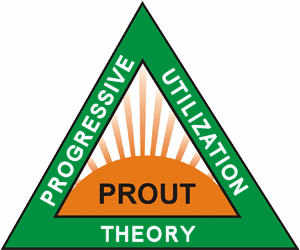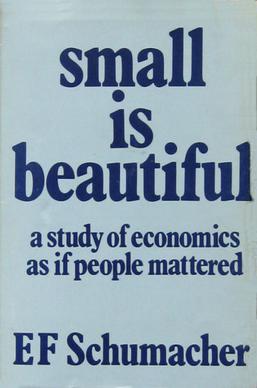Income is the consumption and saving opportunity gained by an entity within a specified timeframe, which is generally expressed in monetary terms. Income is difficult to define conceptually and the definition may be different across fields. For example, a person's income in an economic sense may be different from their income as defined by law.
Neoclassical economics is an approach to economics in which the production, consumption, and valuation (pricing) of goods and services are observed as driven by the supply and demand model. According to this line of thought, the value of a good or service is determined through a hypothetical maximization of utility by income-constrained individuals and of profits by firms facing production costs and employing available information and factors of production. This approach has often been justified by appealing to rational choice theory.
Productivism or growthism is the belief that measurable productivity and growth are the purpose of human organization, and that "more production is necessarily good". Critiques of productivism center primarily on the limits to growth posed by a finite planet and extend into discussions of human procreation, the work ethic, and even alternative energy production.

Wealth is the abundance of valuable financial assets or physical possessions which can be converted into a form that can be used for transactions. This includes the core meaning as held in the originating Old English word weal, which is from an Indo-European word stem. The modern concept of wealth is of significance in all areas of economics, and clearly so for growth economics and development economics, yet the meaning of wealth is context-dependent. A person possessing a substantial net worth is known as wealthy. Net worth is defined as the current value of one's assets less liabilities.

Simple living refers to practices that promote simplicity in one's lifestyle. Common practices of simple living include reducing the number of possessions one owns, depending less on technology and services, and spending less money. In addition to such external changes, simple living also reflects a person's mindset and values. Simple living practices can be seen in history, religion, art, and economics.

Ernst Friedrich Schumacher was a German-British statistician and economist who is best known for his proposals for human-scale, decentralised and appropriate technologies. He served as Chief Economic Advisor to the British National Coal Board from 1950 to 1970, and founded the Intermediate Technology Development Group in 1966.

The Theory of the Leisure Class: An Economic Study of Institutions (1899), by Thorstein Veblen, is a treatise of economics and sociology, and a critique of conspicuous consumption as a function of social class and of consumerism, which are social activities derived from the social stratification of people and the division of labor; the social institutions of the feudal period that have continued to the modern era.

The Progressive utilization theory (PROUT) is a socioeconomic and political philosophy created by the Indian philosopher and spiritual leader Prabhat Ranjan Sarkar. He first conceived of PROUT in 1959. Its proponents (Proutists) claim that it exposes and overcomes the limitations of capitalism, communism and mixed economy. Since its genesis, PROUT has had an economically progressive approach, aiming to improve social development in the world. It is in line with Sarkar's Neohumanist values which aim to provide "proper care" to every being on the planet, including humans, animals and plants.

Gross National Happiness, sometimes called Gross Domestic Happiness (GDH), is a philosophy that guides the government of Bhutan. It includes an index which is used to measure the collective happiness and well-being of a population. Gross National Happiness Index is instituted as the goal of the government of Bhutan in the Constitution of Bhutan, enacted on 18 July 2008.

A steady-state economy is an economy made up of a constant stock of physical wealth (capital) and a constant population size. In effect, such an economy does not grow in the course of time. The term usually refers to the national economy of a particular country, but it is also applicable to the economic system of a city, a region, or the entire world. Early in the history of economic thought, classical economist Adam Smith of the 18th century developed the concept of a stationary state of an economy: Smith believed that any national economy in the world would sooner or later settle in a final state of stationarity.

Heterodox economics is any economic thought or theory that contrasts with orthodox schools of economic thought, or that may be beyond neoclassical economics. These include institutional, evolutionary, feminist, social, post-Keynesian, ecological, Austrian, humanistic, complexity, Marxian, socialist, anarchist and modern monetary theory economics.

Small Is Beautiful: A Study of Economics As If People Mattered is a collection of essays published in 1973 by German-born British economist E. F. Schumacher. The title "Small Is Beautiful" came from a principle espoused by Schumacher's teacher Leopold Kohr (1909–1994) advancing small, appropriate technologies, policies, and polities as a superior alternative to the mainstream ethos of "bigger is better".
The idea of want can be examined from many perspectives. In secular societies want might be considered similar to the emotion desire, which can be studied scientifically through the disciplines of psychology or sociology. Alternatively want can be studied in a non-secular, spiritual, moralistic or religious way, particularly by Buddhism but also Christianity, Islam and Judaism.

Tibor de Scitovsky, also known as Tibor Scitovsky, was a Hungarian born, American economist who was best known for his writing on the nature of people's happiness in relation to consumption. He was associate professor and professor of economics at Stanford University from 1946 through 1958 and Eberle Professor of Economics from 1970 until his retirement in 1976, when he became Professor Emeritus. In honor of his deep contributions to economic analysis, he was elected Distinguished Fellow of the American Economic Association, Fellow of the Royal Economic Society, member of the American Academy of Arts and Sciences, and Corresponding Fellow of the British Academy.

Buddhist ethics are traditionally based on the enlightened perspective of the Buddha. In Buddhism, ethics or morality are understood by the term Śīla or sīla (Pāli). Śīla is one of three sections of the Noble Eightfold Path. It is a code of conduct that embraces a commitment to harmony and self-restraint, primarily motivated by nonviolence or freedom from causing harm. It has been variously described as virtue, moral discipline and precept.
The economics of happiness or happiness economics is the theoretical, qualitative and quantitative study of happiness and quality of life, including positive and negative affects, well-being, life satisfaction and related concepts – typically tying economics more closely than usual with other social sciences, like sociology and psychology, as well as physical health. It typically treats subjective happiness-related measures, as well as more objective quality of life indices, rather than wealth, income or profit, as something to be maximized.
Resource refers to all the materials available in our environment which are technologically accessible, economically feasible and culturally sustainable and help us to satisfy our needs and wants. Resources can broadly be classified according to their availability as renewable or national and international resources). An item may become a resource with technology .The benefits of resource utilization may include increased wealth, proper functioning of a system, or enhanced well. From a human perspective, a regular resource is anything .To satisfy human needs and wants. From a
Sufficiency economy is the name of a Thai development approach attributed to the late King Bhumibol Adulyadej's "sufficiency economy philosophy" (SEP). It has been elaborated upon by Thai academics and agencies, promoted by the Government of Thailand, and applied by over 23,000 villages in Thailand that have SEP-based projects in operation.

Relational goods are non-material goods that can only be produced and consumed within groups, and which are intrinsically linked to relationships and interaction. Popular examples include the enjoyment of a football game in a stadium, where the collective enjoyment of the game adds a relational good in terms of excitement and enjoyment to all in the stadium. This constitutes an experience that cannot be had when watching alone. Other examples include group charity work, friendship or reciprocal love. Relational goods can be necessary for the optimization of an activity like the football game example. On the other hand, like Nussbaum suggest, a relational good may be the relationship in itself, with the good being dependent on the existence of the relationship. Friendships is an example of a relationship in which the value that come from the relationship are tied up in the existence and maintenance of the relationship.
Production for use is a phrase referring to the principle of economic organization and production taken as a defining criterion for a socialist economy. It is held in contrast to production for profit. This criterion is used to distinguish communism from capitalism, and is one of the fundamental defining characteristics of communism.












